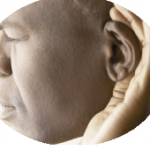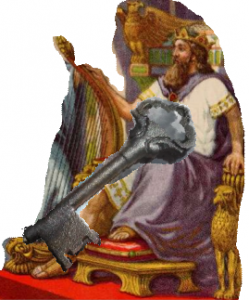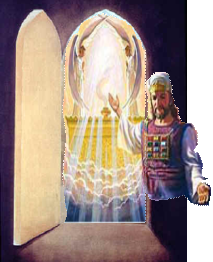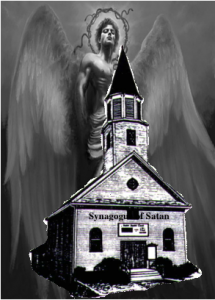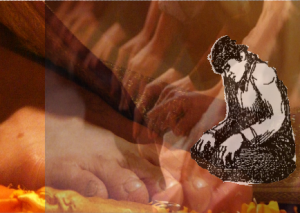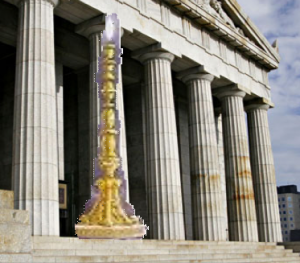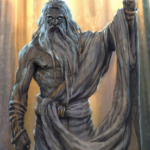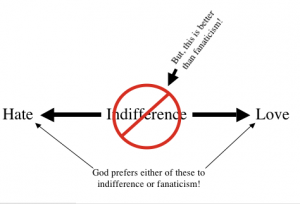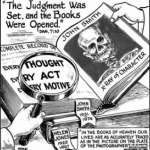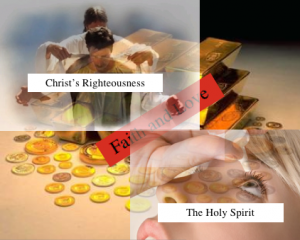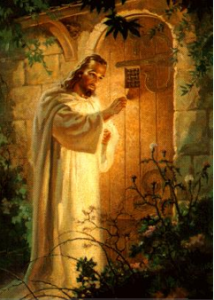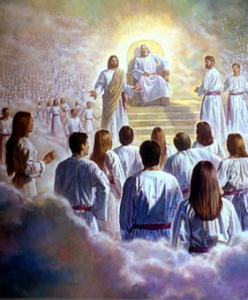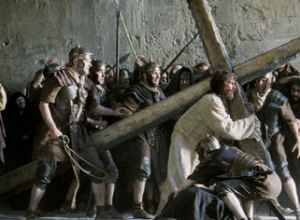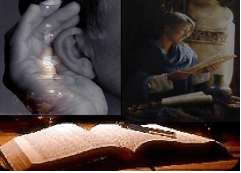Chapter two, having covered four of the “seven churches which are in Asia,” this chapter continues uninterruptedly, beginning with the fifth church. Therefore, the break between Chapters 2 and 3 is purely arbitrary on the part of the translators. It does not indicate a real interruption, either in thought or in time, such as we find between most of the chapters in the book of Daniel. Therefore, at this point at least, it seems clear John was given only one vision on the “isle that is called Patmos . . . on the Lord’s day” (Revelation 1:9, 10), a single, seventh-day Sabbath of one particular week of a month, probably in the year 96 A.D.
Verse 1: And unto the angel of the church in Sardis write; These things saith he that hath the seven Spirits of God, and the seven stars; I know thy works, that thou hast a name that thou livest, and art dead.
Right from the start, the “angels” in this church fared badly in Christ’s estimation. Referring to Himself as the One who has “the seven Spirits of God, and [who holds] the seven stars” represents His overruling providence and ability to look beyond the superficial and see things for what they really are.
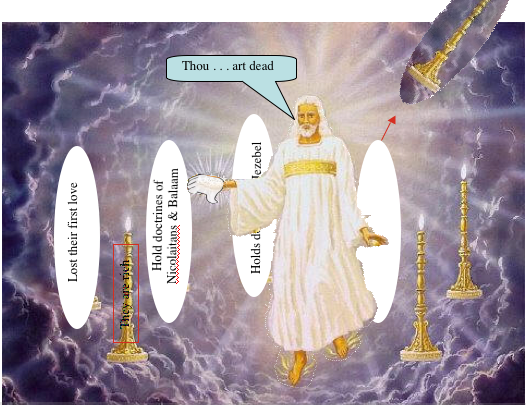
Pointing out that they had “a name that thou livest, and art dead,” without specifying anything positive, suggests hypocrisy had nearly crushed out its life. Maxwell says the history represented by this church covers the years 1565 to 1740 when the church relied “on its Reformation reputation” after the “Lutheran Reformation gave Christianity a new start.” After that “the sweetness” of the Gospel “soured” into contentious debates over doctrinal issues that served to separate them from a vital connection with Christ. He says: “The Bible became a kind of arsenal of theological weapons” [1] they used to attack one another. From that point of view, “the church in Sardis” represents the immediate post Reformation times of the Christian era.
From that perspective, persecution, which this church apparently did not experience, can be seen as a blessing.
Verse 2: Be watchful, and strengthen the things which remain, that are ready to die: for I have not found thy works perfect before God.
In contrast to the church in “Ephesus,” whose labour, patience, and intolerance of evil and falsehood were commended in spite of losing its “first love;” the church in Smyrna that was “rich” in spite of the “blasphemy” of the Synagogue of Satan; Pergamos, who held fast to Jesus’ name in spite of holding the doctrines of “Balaam” and the “Nicolaitans;” Thyatira whose “charity, service, faith” and patience” were commended in spite of “that woman Jezebel;” the “works” of this church were anything but “perfect.” It is easy to see how this message extends to our time. It is not at all difficult to see imperfection in the other person or religion, but it takes special insight from the Holy Spirit to see our own problems, both personally and corporately.
Speaking of “the admonition . . . to the Sardis church,” White writes: “Does this warning apply to us? Let us individually examine our hearts in the light of God’s word, and let our first work be to set our hearts in order by the help of Christ. . . .
“Let us question our motives and every action of our lives. Are there not many unpleasant pictures hanging in memory’s halls? Often have you needed the forgiveness of Jesus. You have been constantly dependent upon His compassion and love. Yet have you not failed to manifest toward others the spirit which Christ has exercised toward you? Have you felt a burden for the one whom you saw venturing into forbidden paths? Have you kindly admonished him? Have you wept for him and prayed with him and for him? Have you shown by words of tenderness and kindly acts that you love him and desire to save him? As you have associated with those who were faltering and staggering under the load of their own infirmities of disposition and faulty habits, have you left them to fight the battles alone when you might have given them help? Have you not passed these sorely tempted ones by on the other side while the world has stood ready to give them sympathy and to allure them into Satan’s nets? Have you not, like Cain, been ready to say: ‘Am I my brother’s keeper?’ How must the great Head of the church regard the work of your life? How does He to whom every soul is precious, as the purchase of His blood, look upon your indifference to those who stray from the right path? Are you not afraid that He will leave you just as you leave them? Be sure that He who is the true Watchman of the Lord’s house has marked every neglect.” [2]
Verse 3: Remember therefore how thou hast received and heard, and hold fast, and repent. If therefore thou shalt not watch, I will come on thee as a thief, and thou shalt not know what hour I will come upon thee.
The church in Ephesus also received the same counsel to “remember.” For them it was to reflect back on “from whence [they] had fallen” (Revelation 2:5) from the time of Jesus and the twelve apostles. In this case, they were to remind themselves how they had “received and heard” of the difficult time we now call the historic “Dark Age” when those who accepted Christ as their personal Savior, in place of priest and pope, faced the prospect of “sword, flame, captivity” and “spoil” (Daniel 11:33) [3] for 1260 long years. Now, since the papacy received its “deadly wound” and religious freedom is allowed without restraint, they forgot how precious were their opportunities, and their spiritual condition stagnated.
Like the Sardinians, “We have nothing to fear for the future, except as we shall forget the way the Lord has led us, and His teaching in our past history.” [4] And, even though “. . . no man knoweth the day nor the hour of His coming, we are instructed and required to know when it is near. We are further taught that to disregard His warning, and refuse or neglect to know when His advent is near, will be as fatal for us as it was for those who lived in the days of Noah not to know when the flood was coming . . . ‘If therefore thou shalt not watch, I will come on thee as a thief, and thou shalt not know what hour I will come upon thee [Rev. 3:3].’” [5]
Verse 4: Thou hast a few names even in Sardis which have not defiled their garments; and they shall walk with me in white: for they are worthy.
Note the clause “even in” suggesting Jesus considered it remarkable that some had “not defiled their garments” in this church. “Defiled” in what way? Judging from the context, they were defiled because they failed to “hold fast” to Christ’s name, unlike the church in Pergamos who “holdest fast my name” (Revelation 2:13). Those few were like the Thyatirans among whom were a remnant “which have not known the depths of Satan . . .” (Revelation 2:24). Referencing those few in Sardis, White states: “Because of their faith this honor is bestowed on them. In this life they did not boast, nor lift up their souls unto vanity. With intensity of desire, with a pure, holy faith, they grasped the promise of eternal riches. Their one desire was to be like Christ. Ever they kept the standard of righteousness uplifted.” [6] In other words, it was the same “righteousness by faith that Luther learned about at the beginning of the Reformation back in the 1600’s.
Verse 5: He that overcometh, the same shall be clothed in white raiment; and I will not blot out his name out of the book of life, but I will confess his name before my Father, and before his angels.
In this context, being “clothed in white raiment” means being credited, in the “book of life” in heaven, with the righteousness of Christ. It is “impossible for man to overcome in his own strength, with his own feeble moral power; yet man is required to exercise all the capabilities and power that God has given him in order to overcome, and then he needs a higher power, and help has been laid upon One who is mighty to save. Divine power may combine with human effort, that through Jesus man may stand free, a conqueror.” [7]
“Were it not for the power received through Christ we would have no strength. But Christ has all power.” [8] “Our heavenly Father claims not at our hands that which we cannot perform. He desires His people to labor earnestly to carry out His purpose for them. They are to pray for power, expect power, and receive power, that they may grow up into the full stature of men and women in Christ Jesus.” [9] When that happens, the “white raiment” of Christ’s righteousness will be the only characteristic representing that man’s name that is written in “the book of life” when it comes time for Jesus to “confess his name before” God the Father. Nobody’s name will remain in the “book of life” without it.
Jesus was not biased to the “few.” All of the Sardinians, if willing to acknowledge their deficiencies, and claim power from Jesus, could be “clothed in [the] white raiment” of Christ’s righteousness.
Verse 6: He that hath an ear, let him hear what the Spirit saith unto the churches.
“The words, ‘He that hath an ear, let him hear what the Spirit saith unto the churches,’ are repeated after these promises, weighty with importance to the children of God. It is for our eternal interest to know and understand what the Spirit saith unto the churches, and we should search carefully for light and knowledge that we may not be in ignorance of what God has commanded and promised in his precious word. We have souls to be saved or lost, and with the greatest earnestness we should inquire, ‘What shall I do in order to obtain eternal life?’ At the best, life is but short, and it is necessary that we should live this short life in harmony with the law of God, which is the law of the universe. We must have ears to hear, and hearts to understand, what the Spirit saith unto the churches.” [10]
The “ear,” referred to eight times in the book of Revelation, with seven of them contextual with the seven churches, suggests that anybody can “hear” or understand what “the Spirit” is saying. However, only those who choose to listen, can actually “hear.”
Verse 7: And to the angel of the church in Philadelphia write; These things saith he that is holy, he that is true, he that hath the key of David, he that openeth, and no man shutteth; and shutteth, and no man openeth;
The introduction to the church of Ephesus is announced by “he that holdeth the seven stars” and “walketh in the midst of the seven golden candlesticks.” Smyrna’s introduction came from “the first and the last.” Pergamos’ introduction is from “he which hath the sharp sword with two edges.” Thyatira’s introduction is from “the Son of God, who hath his eyes like unto a flame of fire, and his feet . . . like fine brass.” Sardis’ introduction is from “he that hath the seven Spirits of God, and the seven stars.” All of these introductions have parallels to John’s description of Jesus in Chapter 1.
In contrast, the introduction to this church has no parallel. This is the first and only time, in the book of Revelation, Jesus refers to Himself as “he that is holy, he that is true, he that hath the key of David, he that openeth, and no man shutteth . . .” Therefore, at this point, Jesus is going to tell us something about His ministry in heaven that is very, very special!
This “key,” [11] figurative of “power and authority,” must be one of “the keys of hell and of death” (Revelation 1:18) Jesus claimed in Chapter 1. Its relation to “David” must be representative of His human genealogy, where we see Him depicted as the “Lion of the tribe of Juda, the Root of David” and “the root and the offspring of David” (Revelation 5:5 & 22:16). Therefore, it is His humanity that gives Him “power and authority” over “hell” and “death,” including the “second death” (Revelation 2:11). He is the One who opens to all humanity the possibility of enjoying eternal life.
The Pharisees were greatly mystified when Jesus asked them: “What think ye of Christ? whose son is he? They say unto him, The Son of David. He saith unto them, How then doth David in spirit call him Lord, saying, The Lord said unto my Lord, Sit thou on my right hand, till I make thine enemies thy footstool? If David then call him Lord, how is he his son? And no man was able to answer him a word” (Matthew 22:41-46).
Therefore, “the key of David,” must represent man’s fallen nature that He took upon Himself. [12] It enabled Him to open the “door” of hope for humanity that “no [other] man” or angel, could shut or open. That took place at the end of the Philadelphian period in 1844 when Jesus left the Holy place, where John saw Him “in the midst of the seven candlesticks” (Revelation 1:13) before He made His way into the Most Holy place of the heavenly sanctuary.
Verse 8: I know thy works: behold, I have set before thee an open door, and no man can shut it: for thou hast a little strength, and hast kept my word, and hast not denied my name.
The “door,” symbolic of “unlimited opportunity for personal victory in the struggle with sin, and for bearing witness to the saving truth of the gospel,” [13] stands “open” to anyone who chooses to enter. Note that only Jesus has total control of this “door,” in contrast to another “door” in Verse 20 that only man has control of.
The “door” in this verse is in heaven and opens into the heavenly sanctuary, called “the temple” (Verse 12). Therefore, “the Philadelphia period (1844) marks the beginning of the Investigative Judgment described in Dan. 7:10; Rev. 14:6, 7.” [14]
The Philadelphians (in 1844) anticipated Jesus’ second coming to earth, instead of His transitional office move in the heavenly sanctuary to make application of His atonement to all deserving of His sacrifice during the present day anti-typical day of Atonement. Although expecting the second coming was a mistake, still, says Jesus “thou hast a little strength, and has kept my word, and hast not denied my name.” [15]
Verse 9: Behold, I will make them of the synagogue of Satan, which say they are Jews, and are not, but do lie; behold, I will make them to come and worship before thy feet, and to know that I have loved thee.
Note that the church in Smyrna was afflicted by “the blasphemy of them which say they are Jews, and are not, but are the [same] synagogue of Satan” (Revelation 2:9). While the Smyrnans were forced to endure their “blasphemy” and courageously faced being “cast . . . into prison,” even the threat of death; here the tables are turned and “the synagogue of Satan” is forced to concede that Jesus “loved” this church.
Here is an amazing statement by White about that “synagogue”: “You think, that those who worship before the saint’s feet, (Rev. 3:9), will at last be saved. Here I must differ with you; for God shew me that this class were professed Adventists, who had fallen away, and ‘crucified to themselves the Son of God afresh, and put him to an open shame.’ And in the ‘hour of temptation,’ which is yet to come, to show out every one’s true character, they will know that they are forever lost; and overwhelmed with anguish of spirit, they will bow at the saint’s feet.” [16]
According to that statement, the confession of “the synagogue of Satan” has yet to be made―in the future! and by “professed Adventists!” who are “forever lost,” that is, who will “be hurt of the second death” (Revelation 2:11) mentioned in the message to the “church in Smyrna.”
Apparently, there will be a vast sea-change in public opinion regarding those represented by the church in Philadelphia who have “a little strength, and [have] kept [Christ’s] word, and [have] not denied [His] name” even while the “synagogue of Satan” was afflicting them with their “blasphemy” a short time before. Now, sometime after the close of probation, when Satan’s “synagogue” “will know that they are forever lost,” the picture has radically changed. Although the faith of the saints will be confirmed, they will not be jubilant and filled with pride. Rather they will pity their former enemies whom they had tearfully warned about these coming crises.
Verse 10: Because thou hast kept the word of my patience, I also will keep thee from the hour of temptation, which shall come upon all the world, to try them that dwell upon the earth.
Having “kept the word of my patience” in spite of the adverse influence of the “Synagogue of Satan,” Jesus promises to protect them during “the hour of temptation.” It is the same “hour” White speaks of in the above statement which “is yet to come . . .” [17]
Note the last phrase of this verse: “to try them that dwell upon the earth” or who “live” on “the earth.” In other words, the Investigative Judgment, represented by the open “door” (Verses 7 & 8), that began in 1844 with the dead, will turn to the living during “the hour of temptation.”
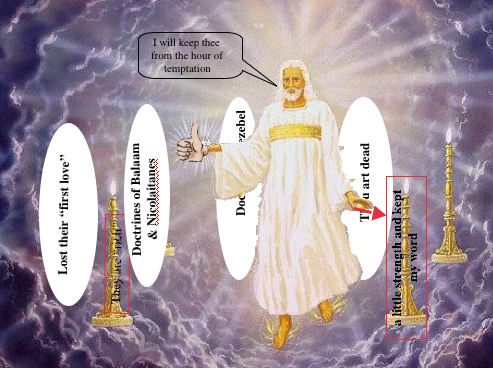
Consequently, the “church in Smyrna” and the “church in Philadelphia” seem to be closely interrelated, with the Philadelphian experience following that of the Smyrnan. Neither come under Christ’s condemnation and both seem to be going through an “hour of temptation.”
Both the Smyrnans and Philadelphians are called upon to face “sword, flame, captivity, and spoil” and “they that understand among the people” had to endure after “them that forsake the holy covenant” join hands with the “vile person” to “place the abomination that maketh desolate” (Daniel 11:21, 30 & 33). It seems, also, that this “hour” will escalate into the literal “ten days” (Revelation 2:10) of “unmitigated” persecution just prior to the close of probation.
According to the White: “Just before us is the ‘hour of temptation, which shall come upon all the world, to try them that dwell upon the earth.’ [Rev. 3:10.] All whose faith is not firmly established upon the Word of God will be deceived and overcome. Satan ‘works with all deceivableness of unrighteousness’ to gain control of the children of men; and his deceptions will continually increase. But he can gain his object only as men voluntarily yield to his temptations. Those who are earnestly seeking a knowledge of the truth, and are striving to purify their souls through obedience, thus doing what they can to prepare for the conflict, will find, in the God of truth, a sure defense. ‘Because thou hast kept the word of my patience, I also will keep thee,’ [Rev. 3:10.] is the Saviour’s promise. He would sooner send every angel out of Heaven to protect his people, than leave one soul that trusts in him to be overcome by Satan.” [18]
Verse 11: Behold, I come quickly: hold that fast which thou hast, that no man take thy crown.
Although spoken nearly 2,000 years ago, Jesus will “come quickly” to every one who has ever lived! When death intervenes our “thoughts perish” (Psalms 146:4) at that very instant, and time (for the dead) ceases. At the resurrection (whether the “first” or the “second’) our thinking will begin where it left off. When each has collected their thoughts, a time warp will seem to have taken place. Nothing will be the same. Those who lived in expectancy for the Lord’s coming will be able to quickly accommodate themselves to the change and exuberantly welcome Jesus without reservation, saying: “Lo, this is our God; we have waited for him, and he will save us: this is the LORD; we have waited for him, we will be glad and rejoice in his salvation” (Isaiah 25:9). In spite of having “waited for him,” they really didn’t “wait” very long even if they had died more than 6,000 years ago! To all, He will have “come quickly.”
Jesus is speaking here in context of an experience much like the churches in Smyrna and Philadelphia when God’s people will again be forced to endure the “blasphemy of . . . the synagogue of Satan.” The “crown,” they are to retain at all cost, is the same “crown of life” promised the Smyrnans who were to be “faithful unto death” (Revelation 2:10).
The enormous value of that “crown” is depicted in a vision White had when she “was shown this earth, dark and gloomy. Said the angel: ‘Look carefully!’ Then I was shown the people upon the earth. Some were surrounded by angels of God, others were in total darkness, surrounded by evil angels. I saw an arm reached down from heaven, holding a golden scepter. On the top of the scepter was a crown studded with diamonds. Every diamond emitted light, bright, clear, and beautiful. Inscribed upon the crown were these words: ‘All who win me are happy, and shall have everlasting life.’
“Below this crown was another scepter, and upon this also was placed a crown, in the center of which were jewels, gold, and silver, reflecting some light. The inscription upon the crown was: ‘Earthly treasure. Riches is power. All who win me have honor and fame.’ I saw a vast multitude rushing forward to obtain this crown. They were clamorous. Some in their eagerness seemed bereft of reason. They would thrust one another, crowding back those who were weaker than they, and trampling upon those who in their haste fell. Many eagerly seized hold of the treasures within the crown, and held them fast. The heads of some were as white as silver, and their faces were furrowed with care and anxiety. Their own relatives, bone of their bone, and flesh of their flesh, they regarded not; but, as appealing looks were turned to them, they held their treasures more firmly, as though fearful that in an unguarded moment they should lose a little, or be induced to divide with them. Their eager eyes would often fasten upon the earthly crown, and count and recount its treasures. Images of want and wretchedness appeared in that multitude, and looked wishfully at the treasures there, and turned hopelessly away as the stronger overpowered and drove back the weaker. Yet they could not give it up thus, but with a multitude of deformed, sickly, and aged, they sought to press their way to the earthly crown. Some died in seeking to reach it. Others fell just in the act of taking hold of it. Many had but just laid hold of it when they fell. Dead bodies strewed the ground, yet on rushed the multitude, trampling over the fallen and dead bodies of their companions. Everyone who reached the crown possessed a share in it, and was loudly applauded by an interested company standing around it.
“A large company of evil angels were very busy. Satan was in the midst of them, and all looked with the most exulting satisfaction upon the company struggling for the crown. He seemed to throw a peculiar charm upon those who eagerly sought it. Many who sought this earthly crown were professed Christians. Some of them seemed to have a little light. They would look wishfully upon the heavenly crown, and would often seem charmed with its beauty, yet they had no true sense of its value and glory. While with one hand they were reaching forth languidly for the heavenly, with the other they reached eagerly for the earthly, determined to possess that; and in their earnest pursuit for the earthly, they lost sight of the heavenly. They were left in darkness, yet were anxiously groping about to secure the earthly crown. Some became disgusted with the company who sought it so eagerly; they seemed to have a sense of their danger, and turned from it, and earnestly sought for the heavenly crown. The countenances of such soon changed from dark to light, from gloom to cheerfulness and holy joy.
“I then saw a company pressing through the crowd with their eyes intently fixed upon the heavenly crown. As they earnestly urged their way through the disorderly crowd, angels attended them, and made room for them to advance. As they neared the heavenly crown, the light emanating from it shone upon them and around them, dispelling their darkness, and growing clearer and brighter, until they seemed to be transformed, and resembled the angels. They cast not one lingering look upon the earthly crown. Those who were in pursuit of the earthly, mocked them, and threw black balls after them. These did them no injury while their eyes were fixed upon the heavenly crown, but those who turned their attention to the black balls were stained with them.” [19]
Those who value the “earthly crown” are the ones who “threw” those “black balls,” representing gossip and slander, against the seekers of the “heavenly crown.” The seekers of the heavenly crown will prepare themselves for “the hour of temptation which shall come upon all the world, to try them that dwell upon the earth” (Verse 9).
Verse 12: Him that overcometh will I make a pillar in the temple of my God, and he shall go no more out: and I will write upon him the name of my God, and the name of the city of my God, which is new Jerusalem, which cometh down out of heaven from my God: and I will write upon him my new name.
In the context of Philadelphia, the overcomers are those who resist the “synagogue of Satan.” Jesus then gives them a series of absolutely incredible promises, the first of which is to make them “a pillar in the temple . . .”
The “temple” is where God’s throne is located. Upon the throne, “the Ancient of days did sit” when “the judgment was set, and the books were opened” and “one like the Son of man came . . . to the Ancient of days” (Daniel 7:9, 10, 13). The “door” is also in the temple between the holy and most holy places that Jesus unlocked with the “key of David” to commence the Investigative Judgment of every man, woman, and child who ever lived. The promise to the overcomer of being made a “pillar in the temple” is truly remarkable.
Literally speaking, a “pillar” is used to support something, such as a roof or a bridge. The strength of the structure is dependent upon the pillars that support it. Paul used the same figure of speech when he wrote that “James, Cephas, and John . . . seemed to be pillars” (Galatians 2:9) or “leaders in the church.” [20] To Paul, those apostles only “seemed” strong and supportive to the church. While it seems James and John were loyal and faithful to the end, “when Peter [21] was come to Antioch, [Paul] withstood him to the face, because he was to be blamed” for showing favoritism to “them which were of the circumcision” (Galatians 2:9-12).
Paul was not self-righteous. He acknowledged even himself to be a sinner “of whom I am chief” (1 Timothy 1:15). He went even further saying “it is a very small thing that I should be judged of you, or of man’s judgment: yea, I judge not mine own self” (1 Corinthians 4:3).
It is significant to note that the Lord held nothing against either the church of Smyrna or Philadelphia in spite of both being afflicted by “the synagogue of Satan.” The characteristics of the church in Philadelphia bear little resemblance to any church congregation of history, even though it coincides, to some extent, with the time during which William Miller was preaching the soon coming of Christ, prior to 1844.
Nevertheless, the great enthusiasm and eagerness that seized the church while it was earnestly looking and working to spread the gospel of His coming, must certainly characterize the Christian experience of anyone who anticipates the Lord’s soon coming.
Verse 13: He that hath an ear, let him hear what the Spirit saith unto the churches.
This message to the last church is “designed to arouse the people of God, to discover to them their backslidings, and to lead to zealous repentance, that they may be favored with the presence of Jesus, and be fitted for the loud cry of the third angel,” [22] an experience much like that of the Philadelphians.
Verse 14: And unto the angel of the church of the Laodiceans write; These things saith the Amen, the faithful and true witness, the beginning of the creation of God;
“This name has been defined as meaning ‘judging the people’ or ‘a people adjudged.’ The latter appears preferable here.” [23]
One cannot help but reflect back to Belshazzar’s alarm with the sudden appearance of a hand writing God’s judgment of his character and behavior on the wall of the palace “thou art weighed in the balances, and art found wanting” (Daniel 5:27), suggesting that the judgment concept is of great importance in the Laodicean period of church history.
Note Jesus’ reference to Himself as “the Amen” suggesting this church to be the “Omega” (Revelation 1:11) or ending of his critique of the seven churches. While we might expect the number “seven” to depict an era of perfection, this church is anything but! Nevertheless, since He is “the beginning of the creation,” He is able to make all things new and even use the “angel of the church of the Laodiceans” to finish what He began.
Verse 15: I know thy works, that thou art neither cold nor hot: I would thou wert cold or hot.
In spite of His great expectations, Christ does not specify much that is good about our last day church. It is much like the “church in Sardis” who had “a name that thou livest, and art dead” (Revelation 3:1), who was alive during the Protestant Reformation, but sunk into lethargy when persecution ceased after 1798. It was reawakened by William Miller’s message prior to 1844 but collapsed following the great disappointment. Their condition is even worse than that of Sardis. While Sardis was “dead,” synonymous with “cold,” it was a more desirable condition than Laodicea’s, which is only half “cold.” Note what Jesus is saying: “I would thou wert” or I wish you were either of the two extremes, meaning choice is the deciding factor here.
Verse 16: So then because thou art lukewarm, and neither cold nor hot, I will spue thee out of my mouth.
Even though the church is half-hearted, Jesus is not. Christ indicates total rejection here, for “spue” means “to vomit, vomit forth, throwup.” [24] When He looks at this church, he gets nauseated, sick to His stomach! “To those who are indifferent at this time, Christ’s warning is: ‘Because thou art lukewarm, and neither cold nor hot, I will spew thee out of My mouth.’ Revelation 3:16. The figure of spewing out of His mouth means that He cannot offer up your prayers or your expressions of love to God. He cannot endorse your teaching of His word or your spiritual work in anywise. He cannot present your religious exercises with the request that grace be given you.” [25] Note the first sentence equating indifference with lukewarmness. In that case “cold” equates with hatred and “hot” with love.
Therefore, God prefers us to either despise Him or love Him. He detests those who are indifferent to Him or uncaring about Him. Therefore, the most hopeless spiritual condition is indifference; there is more hope for an atheist than for a hypocritical Christian.
Verse 17: Because thou sayest, I am rich, and increased with goods, and have need of nothing; and knowest not that thou art wretched, and miserable, and poor, and blind, and naked:
Interestingly, “The testimony to the Laodicean church was generally received; but some . . . were making bad use of it. Instead of applying it to their own hearts, so as to be benefited by it themselves, they were using the testimony to oppress others. A few taught that the brethren must sell all out before they could be free, while some others dwelt much upon dress, carrying the subject to an extreme and with a few others there was a narrowing up of the work of the third message, and following of impressions, and casting fear upon the conscientious. These things had a blighting influence, and have caused us to lay down our testimony on the subject almost entirely.
“The design of the message to the Laodiceans was to rid the church of just such fanatical influences; but the effort of Satan has been to corrupt the message, and to destroy its influence. He would be better pleased to have fanatical persons embrace the testimony, and use it in his cause, than to have them remain in a lukewarm state. I have seen that it was not the design of the message to lead brother to sit in judgment over his brother, to tell him what to do, and just how far to go; but for each individual to search his own heart, and attend to his own individual work. It is the work of the angels to watch the development of character, and weigh moral worth.” [26] Consequently, fanaticism is even worse, in the sight of God, than lukewarmness! This diagram might be helpful in understanding this concept.
The picture of this obese young man standing before a mirror and seeing only what he wants to see illustrates quite well the Laodicean condition. We all tend to believe much better of ourselves than how God sees us. The next verse suggests the cure for such spiritual blindness that we are all so vulnerable to.
Obviously, this is all judgment language depicting God’s attitude toward the character and behavior of the Laodicean church. Furthermore, it was only after 1844 that the Investigative Judgment came to be understood. Contempt has been heaped upon the concept as a “feeble face-saving attempt” [27] devised to account for the disappointment of 1844. But that is far from the truth. Considering that the name “Laodicea” means: “’judging the people,’ or ‘a people adjudged,’” [28] it is a most appropriate title for those living when “the judgment was set and the books were opened” (Daniel 7:10).
Like Nebuchadnezzar who was being watched by the “watcher and an holy one” and by “the watchers . . . and the holy ones” (Daniel 4;15, 17) in heaven, we are being investigated and judged by God and the angels more closely than ever before. And for good reason; for we are to stand during a “time of trouble, such as never was since there was a nation . . .” (Daniel 12:1), yet, at the same time, vindicate the character of God! This “warning for the last church also must be proclaimed to all who claim to be Christians. The Laodicean message, like a sharp, two-edged sword, must go to all the churches . . . It is our work to proclaim this message. Are we putting forth every effort that the churches may be warned?” [29]
Verse 18: I counsel thee to buy of me gold tried in the fire, that thou mayest be rich; and white raiment, that thou mayest be clothed, and that the shame of thy nakedness do not appear; and anoint thine eyes with eyesalve, that thou mayest see.
The remedy for our spiritual condition is threefold: “gold, white raiment” and “eyesalve.” The “gold tried in the fire,” representing “faith and love combined, and love takes the precedence” [30], is designed to make us “rich” like the Smyrnans (Revelation 2:9) who were tried in the furnace of affliction. The “white raiment” of Christ’s righteousness is the substitute for the “filthy rags” (Isaiah 64:6) of our self-righteousness. It enables us to “walk . . . in white” like the “few names . . . in Sardis which have not defiled their garments” (Revelation 3:4). The “eyesalve,” the cure for the spiritual blindness that none of the other churches seem to be afflicted with, enable us to both see and “hear what the Spirit saith unto [all the rest of] the churches” (Revelation 2:7, 11, 29; 3:6, 13, 22), not just Laodicea, because each message is an especially designed lesson for the last church to learn from.
Therefore, we must learn to retain the “first love” lost by the Ephesian church; be faithful unto death like the church in Smyrna; understand and repudiate the doctrines of Balaam and the Nicolaitanes that the church in Pergamos had; turn away from the doctrine of Jezebel held by the church in Thyatira; make sure that we live up to our name unlike the church in Sardis; keep the word of God’s patience like the church in Philadelphia.
The precious items illustrated here are sure cures for the many failures seen by “the Amen, the faithful and true witness, the beginning of the creation of God” (Verse 14). They will also enable us to labour and be patient, calling sin by its right name like the church in Ephesus; to fear none of those things that we shall suffer like the church in Smyrna; to remain faithful even “where Satan’s seat is” like the church in Pergamum; to have “charity, and service, and faith” like the church in Thyatira; to walk with Jesus in white like some in Sardis, and finally become “a pillar in the temple of God” like the church in Philadelphia.
Verse 19: As many as I love, I rebuke and chasten: be zealous therefore, and repent.
In spite of the complete lack of anything commendable about our church, Jesus, who soundly chastens us, still loves us! That should bring us great courage. Therefore, we should return to our “first love,” reject the “deeds” and “doctrine” of the Nicolaitans and of Balaam as well as the doctrine of “that woman Jezebel,” and face up to the deadness of spiritual apathy like the “few names in Sardis.” Is that too much to ask? The answer is up to each individual. “Make diligent efforts to redeem the past. No longer remain in the condition of the Laodicean church.” [31] “Not one of us will ever receive the seal of God while our characters have one spot or stain upon them. It is left with us to remedy the defects in our characters, to cleanse the soul temple of every defilement. Then the latter rain will fall upon us as the early rain fell upon the disciples on the Day of Pentecost.” [32] That is what it means to “be zealous . . . and repent.” Since the Smyrnans and the Philadelphians are not called upon to “repent,” it seems their condition represents the ideal.
Verse 20: Behold, I stand at the door, and knock: if any man hear my voice, and open the door, I will come in to him, and will sup with him, and he with me.
This is another assurance that Jesus has not forsaken His erring, Laodicean church. The “door” He is standing at, is not the “door” of Verse 8 that “no man can shut” or open except Jesus. This one is a “door” to the heart that we control. All can choose to open or keep it closed. Isn’t it remarkable that Jesus, the “Alpha and Omega, the beginning and the ending . . . which is, and which was, and which is to come, the Almighty” (Revelation 1:8), humbles Himself to “stand at the door, and knock” instead taking advantage of His position―and just barge in! As improbable and as foolish as it seems, we, feeble human beings, can say “no” to God and He respects that choice!
But, when He comes in, He tells us how and gives us the power to clean house. So, it’s more than just a pleasant meal. There is work to do and Jesus loves us too much to overlook that which needs His attention. He kindly and tenderly points out the needed changes and the filth that we have been harboring. And, as long as He has our consent, he cleans it all out, doing that which we are powerless to do in our own strength.
Verse 21: To him that overcometh will I grant to sit with me in my throne, even as I also overcame, and am set down with my Father in his throne.
This verse makes it clear Jesus had no advantage over us. He “overcame” the same way we must. Furthermore: “As the will of man co-operates with the will of God, it becomes omnipotent. Whatever is to be done at His command may be accomplished in His strength. All His biddings are enablings.” [33] “Christ rejoiced that He could do more for His followers than they could ask or think. He knew that the truth, armed with the omnipotence of the Holy Spirit, would conquer in the contest with evil; and that the blood-stained banner would wave triumphantly over His followers. He knew that the life of His trusting disciples would be like His . . . a series of uninterrupted victories, not seen to be such here, but recognized as such in the great hereafter.” [34]
It also makes clear His nature was the same as ours―fallen. Without it He could not claim to have “the key of David” nor “the keys of hell and of death” (Revelation1:8; 3:7). “Those who claim that it was not possible for Christ to sin, cannot believe that He really took upon Himself human nature. But was not Christ actually tempted, not only by Satan in the wilderness, but all through His life, from childhood to manhood? In all points He was tempted as we are, and because He successfully resisted temptation under every form, He gave man the perfect example, and through the ample provision Christ has made, we may become partakers of the divine nature, having escaped the corruption which is in the world through lust.
“Jesus says [Rev. 3:21 quoted] Here is the beginning of our confidence which we must hold steadfast unto the end. If Jesus resisted Satan’s temptations, He will help us to resist. He came to bring divine power to combine with human effort.” [35]
Verse 22: He that hath an ear, let him hear what the Spirit saith unto the churches.
“Ministers and people have declared the prophecies of Daniel and John to be a collection of mysteries which no one could understand or explain. But the very title of the book of Revelation contradicts these assertions: ‘The Revelation of Jesus Christ, which God gave unto Him, to show unto His servants things which must shortly come to pass; and He sent and signified it by His angel unto His servant John, who bare record of the word of God, and of the testimony of Jesus Christ, and of all things that he saw. Blessed is he that readeth, and they that hear the words of this prophecy, and keep those things which are written therein; for the time is at hand.’
“Says the prophet, ‘Blessed is he that readeth’ ―there are some who will not read; the blessing is not for them. ‘And they that hear’ ―there are some, also, who refuse to hear anything concerning the prophecies; the blessing is not for this class. ‘And keep those things that are written therein’ ―many refuse to heed the warnings and instructions contained in the Revelation. None of these can claim the blessing promised. All who ridicule the subjects of the prophecy, and mock at the symbols here solemnly given, all who refuse to reform their lives, and prepare for the coming of the Son of man, will be unblest.
“In view of the testimony of Inspiration, how dare ministers teach that the Revelation is a mystery beyond the reach of human understanding? It is a mystery revealed, a book opened. The study of the Revelation directs the mind to the prophecies of Daniel, and both present most important instruction, given of God to men, concerning events to take place at the close of this world’s history.
“To John were opened scenes of deep and thrilling interest in the experience of the church. He saw the position, dangers, conflicts, and final deliverance of the people of God. He records the closing messages which are to ripen the harvest of the earth, either as sheaves for the heavenly garner or as fagots for the fires of the last day. Subjects of vast importance were revealed to him especially for the last church, that those who should turn from error to truth might be instructed concerning the perils and conflicts before them. None need be in darkness in regard to what is coming upon the earth.
“Why, then, this wide-spread ignorance concerning an important part of Holy Writ? Why this general reluctance to investigate its teachings? It is the result of a studied effort of the prince of darkness to conceal from men that which reveals his deceptions. For this reason, Christ the Revelator, foreseeing the warfare that would be waged against the study of the Revelation, pronounced a blessing upon all who should read, hear, and observe the words of the prophecy. . . .
“The Bible was designed to be a guide to all who wish to become acquainted with the will of their Maker. God gave to men the sure word of prophecy; angels and even Christ Himself came to make known to Daniel and John the things that must shortly come to pass. Those important matters that concern our salvation were not left involved in mystery. They were not revealed in such a way as to perplex and mislead the honest seeker after truth. Said the Lord by the prophet Habakkuk, ‘Write the vision, and make it plain upon tables, that he may run that readeth it.’ The word of God is plain to all who study it with a prayerful heart. Every truly honest soul will come to the light of truth. ‘Light is shown for the righteous.’ No church can advance in holiness unless its members are earnestly seeking for truth as for hid treasure.” [36]
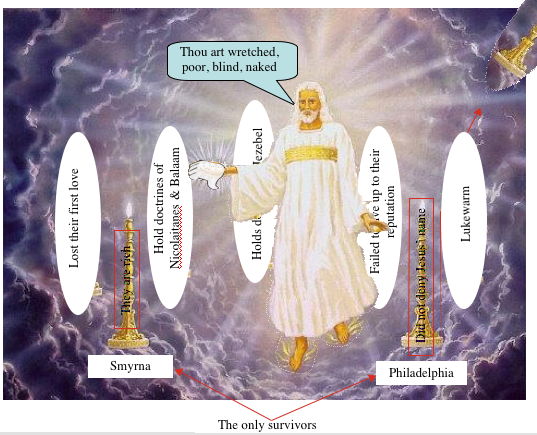
In contemplation of those words, remember: “The Bible, with its precious gems of truth, was not written for the scholar alone. On the contrary, it was designed for the common people. The poor man needs it as much as the rich man, the unlearned as much as the learned. It is a great mistake for ministers to give people the impression that they can not understand the teachings of the Word of God, and should be content with the interpretation given by those whose business it is to proclaim the Word of God. Ministers who thus educate the people are themselves in error. To him who loves the truth, the Word of God is as a light shining in a dark place, pointing out the path so plainly, that the wayfaring man, tho a fool, need not err therein.” [37] There is no reason to believe, in spite of the large use of symbols, that those principles do not apply to the study of Revelation as well as to the rest of the Bible!
Although Laodicea is the last of the seven churches, we have only finished our study of Chapter 3, leaving 19 more chapters to go. How far, therefore, does the message to the Laodicean church extend? It certainly does not end with Chapter 3!
Consequently, God’s council to Laodicea does not end at the last verse of Chapter 3. In fact, it continues on throughout the rest of the book of Revelation! That is true because: John “saw the position, dangers, conflicts, and final deliverance of the people of God. He records the closing messages which are to ripen the harvest of the earth, either as sheaves for the heavenly garner or as fagots for the fires of destruction. Subjects of vast importance were revealed to him especially for the last church . . .” [38] ―the “last church” is Laodicea!
Therefore, even though Jesus rejects the spiritual condition of the Laodicean church, that does not mean He has abandoned them! Keep in mind the remedies He offers in Verse 18. If we “buy” them without money and without price, we can experience full recovery and be prepared for anything!
Summary of Chapter 3: This chapter covers the last of the seven churches which are in Asia, inclusive of Sardis, Philadelphia and Laodicea. As with the first four, Jesus points out the good points in each as well as the bad, with the exception of Laodicea where only condemnation is indicated. But, since chapters two and three should be seen as a whole, this summary would be incomplete without including what we learned in Chapter 2. Obviously, this is a judgment scenario where Jesus evaluates the character and behavior of each church. Although the churches are numbered and handled sequentially, the last church, having all the information and experience gleaned from the previous, is by far the most responsible and is held most accountable. This is vitally important because those living in the time of Laodicea will be those living during the last moments of this earth’s history. It is also the time when God selects out of the “mountain” (Daniel 2:45) (that probably represents the church on earth) those who will vindicate God’s name during a time of trouble such as never was since there was a nation (Daniel 12:1). They will refute all of Satan’s charges against God’s government and thereby cause the overthrow of Satan’s government represented by the great metallic image of Daniel 2. By this time, it is evident that the churches of Smyrna and Philadelphia, in which Jesus does not point out any failure, but, nevertheless, are afflicted with the “synagogue of Satan,” are representative of the last day experience of those represented by the “stone” of Daniel 2:34, 45.
[1] see God Cares by Mervyn Maxwell, Vol. 2, pages 126, 127
[2] Testimony for the Church by E.G. White, Vol. 5, pages 610, 611 (ellipse supplied)
[3] Although I see the application of that phrase to the future “dark age,” it certainly applies to the historic one, as well.
[4] Life Sketches by E.G. White, page 196 (italics supplied)
[5] Great Controversy by E.G. White, page 371 (underlining supplied)
[6] Advent Review and Sabbath Herald 8-10-1905
[7] Ibid 6-10-1890
[8] Heavenly Places by E.G. White, page 188
[9] Maranatha by E.G. White, page 212
[10] Signs of the Times 6-15-1891
[11] “key” from “kleis” (Strong’s #2807) kleiv kleis klice, from 2808; TDNT – 3:744,439; n f. KJV – key 6; 6. 1) a key, 1a) since the keeper of the keys has the power to open and to shut, 1b) metaph. in the NT to denote power and authority of various kinds
[12] see, for example, 1888 Materials by E.G. White, page 1561: “Christ’s life of humiliation should be a lesson to all who desire to exalt themselves above their fellow-men. Though he had no taint of sin upon his character, yet he condescended, to connect our fallen human nature with his divinity. By thus taking humanity, he honored humanity. Having taken our fallen nature, he showed what it might become, by accepting the ample provision he has made for it, and by becoming partaker of the divine nature.”
[13] Seventh-day Adventist Bible Commentary, Vol. 7, page 758 (left column under “An open door.”)
[14] Ibid (left column under “An open door.”)
[15] note the similarity of that feature with the church in Pergamos that “holdest fast my name, and hast not denied my faith.” Revelation 2:12, 13
[16] A Word to the Little Flock by E.G. White, page 12
[17] Ibid
[18] The Great Controversy by E.G. White, page 560 (italics supplied, the brackets are NOT supplied)
[19] Testimonies for the Church by E.G. White, Vol. 1, pages 347-349 (italics supplied)
[20] thought based on comment in Seventh-day Adventist Bible Commentary, Vol. 6, page 946 (under “Pillars.”)
[21] “Cephas” was Peter’s name in Aramaic (see Strong’s #2786)
[22] Testimonies to the Church by E.G. White, Vol. 1, page 186
[23] see Seventh-day Adventist Bible Commentary, Vol. 7, page 760 (top right column)
[24] “spue” from “emeo” (Strong’s #1692)
[25] Testimonies for the Church, by E.G. White, Vol. 6, page 408 (brackets mine to make it more personal)
[26] Life Sketches of James White and Ellen G. White (1888 edition), pages 333, 334 (bracket and italics mine); Spiritual Gifts by E.G. White, Vol. 2, page 223; Seventh-day Adventist Bible Commentary, Vol. 7, page 962
[27] https://ssnet.org/blog/why-the-investigative-judgment-doctrine-is-sound/
[28] Seventh-day Adventist Bible Commentary, Vol. 7 page 760 (top right column)
[29] Testimonies for the Church by E.G. White, Vol. 6, page 77 (italics mine)
[30] Ibid, Vol. 2, page 36
[31] Ibid, Vol. 7, page 67
[32] Ibid, Vol. 5, page 214
[33] Christ Object Lessons by E.G. White, page 333
[34] Gospel Workers by E.G. White, page 38, 39
[35] Seventh-day Adventist Bible Commentary, Vol. 7 page 929
[36] Spirit of Prophecy by E.G. White, Vol. 4, pages 210-212, 344 (underlining supplied)
[37] Signs of the Times 7-11-06
[38] Great Controversy by E.G. White, pages 341, 342 (italics supplied)




